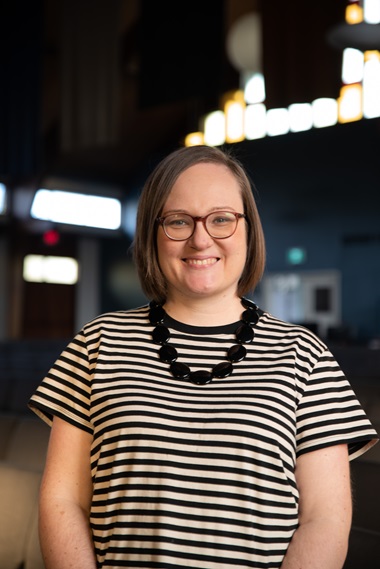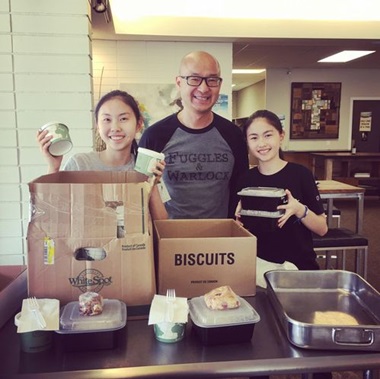
Jenn Richards has discovered “a resistance that assumes positive intent” at several churches which offer meals in Richmond.
An act of resistance takes place every Monday morning in a small United Church in Richmond. There are no coloured posters or megaphones; rather the tools of this work are grocery bags, aprons and retired women – the latter being a particular force of skill and courage to reckon with.
I am one of the lucky few who has an insider scoop on this particular endeavour because I am privileged enough to be one of the pastors to its leader. Kim Snider has chosen to spend a large portion of this season of her life feeding those in Richmond who are often forgotten or misunderstood.
In the first half of 2024 I heard snippets about Kim’s work and my curiosity grew to the point where one Saturday morning last November I sent her a text asking if I could join in with whatever it was she did on Monday mornings. She sent back a simple reply that I was more than welcome to show up at St. Alban’s Anglican Church backdoor at 9 am, and to bring an apron.
I felt like James Bond with running shoes. Monday morning rolled around and though I was prepared for the chopping and stirring, what I wasn’t prepared for was the resistance work afoot. What I was witnessing was a resistance against dehumanization.
Every Monday morning, Kim and a group of three to five other talented volunteers congregate in St. Alban’s kitchen to cook and package 80 takeout meals, which are then refrigerated and delivered on Tuesday nights to those in need. This in itself is noble work and could easily be driven by the age-old saying, “They get what they get and shouldn’t get upset.”
Rather, a multitude of actions point towards resisting this mindset. Recipes are carefully selected to consider nutrition, taste and whether they would be enjoyable when eaten cold. Lemons are freshly squeezed for dressings and marinades, dishes are sampled to ensure the spices are well balanced and care is taken to cool the food before it’s portioned into boxes so that soggy servings don’t ensue.
No one is under the illusion that every meal is a home run with all the recipients, but the goal is that each and every person who receives one of these 80 meals will open their box and sense it was made with care.
This resistance work expands to other corners of Richmond as well. Between various church locations in the city, a person can receive a free meal five nights a week. Each of these meals serve 80 to 120 people, with an additional 80 meals made that are then delivered.
Serving both in-person and delivered meals reveals a desire to resist one-size-fits-all assumptions about those in poverty. For some, a sit-down meal plays an important factor in aiding their sense of connection and care. But for others, such as those who live in their cars, the barrier of expensive gas prices and then the risk of leaving their car and belongings to be stolen or towed, makes having a meal delivered a much-needed option.
Within the rhythms of the various Richmond community meals alone, dignity is offered in myriad creative ways, including: serving food on plates with proper silverware, calling recipients “guests,” encouraging volunteers to sit and eat with the guests and bringing in various community services such as the Richmond Public Library, free haircutting and hearing clinics.

Wayne Masing, centre, is volunteer coordinator of the Wednesday evening community meal at Church On Five.
When I sat down with Wayne Masing, an RBC Operations Support liaison by day and volunteer coordinator of the Wednesday community meal at Church On Five by night, he had story after story of the ways this work – though not without its challenges – has been paradigm-shifting for him.
One particular line has stuck with me. He said: “I think a lot about what I would want if I was homeless.” These simple words sum up the core of this resistance. Though the complexities are ever present and there’s always more work that could be done, what’s forefront in these individual’s minds is human-shaped love.
I’m sure there would be some who question my word choice in labelling this as a work of resistance – and yet when I drive away on Monday mornings with a dirty apron and the smell of onions lingering on my fingers, I am ever more convinced that is exactly what this is.
It’s a resistance that assumes positive intent, that people are doing the best that they can, and that asks each of us, “What do I have to give?” It’s a resistance that disqualifies no one. It’s work that hopes for big change while also doing the slow and steady work of simple acts of justice today. It’s a work that is not selective, but simply offers what exists to whoever needs it.
I must admit, my motivation to keep coming back on Mondays has a self-serving thread woven into it. I want to apprentice under the quiet, tenacious care I keep witnessing.
In a world where resistance work is marked by email blasts, highway billboards and viral videos, I’m coming to realize it’s the quiet and steady work that has lasting impact, and I’m here to learn from this type of resistance work in my midst.
Jenn Richards is an Associate Pastor at Tapestry Nights, the Saturday night campus of The Tapestry Church in Richmond. She holds an MDiv from Regent College and loves the food, culture and creative missional living that the Pacific Northwest offers.
She has posted this comment on this site as a member of The Bell: Diverse Christian Voices in Vancouver. Go here to see earlier comments in the series.
